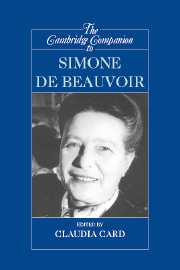Book contents
- Frontmatter
- Introduction: Beauvoir and the ambiguity of “ambiguity” in ethics
- 1 Beauvoir’s place in philosophical thought
- 2 Reading Simone de Beauvoir with Martin Heidegger
- 3 The body as instrument and as expression
- 4 Beauvoir and Merleau-Ponty on ambiguity
- 5 Bergson’s influence on Beauvoir’s philosophical methodology
- 6 Philosophy in Beauvoir’s fiction
- 7 Complicity and slavery in The Second Sex
- 8 Beauvoir on Sade: making sexuality into an ethic
- 9 Beauvoir and feminism: interview and reflections
- 10 Life-story in Beauvoir’s memoirs
- 11 Beauvoir on the ambiguity of evil
- 12 Simone de Beauvoir: (Re)counting the sexual difference
- 13 Beauvoir and biology: a second look
- 14 Beauvoir’s Old Age
- Bibliography
- Index
4 - Beauvoir and Merleau-Ponty on ambiguity
Published online by Cambridge University Press: 28 May 2006
- Frontmatter
- Introduction: Beauvoir and the ambiguity of “ambiguity” in ethics
- 1 Beauvoir’s place in philosophical thought
- 2 Reading Simone de Beauvoir with Martin Heidegger
- 3 The body as instrument and as expression
- 4 Beauvoir and Merleau-Ponty on ambiguity
- 5 Bergson’s influence on Beauvoir’s philosophical methodology
- 6 Philosophy in Beauvoir’s fiction
- 7 Complicity and slavery in The Second Sex
- 8 Beauvoir on Sade: making sexuality into an ethic
- 9 Beauvoir and feminism: interview and reflections
- 10 Life-story in Beauvoir’s memoirs
- 11 Beauvoir on the ambiguity of evil
- 12 Simone de Beauvoir: (Re)counting the sexual difference
- 13 Beauvoir and biology: a second look
- 14 Beauvoir’s Old Age
- Bibliography
- Index
Summary
Ambiguity is arguably the most important idea in Beauvoir's philosophy. This chapter argues that Beauvoir's idea of ambiguity has much more in common with Merleau-Ponty's idea of ambiguity than with Sartre's. Beauvoir's philosophy of ambiguity and Merleau-Ponty's philosophy of ambiguity complement each other.
Beauvoir and Merleau-Ponty were friends and knew each other’s work. In a 1945 commentary on Beauvoir’s L’Invitée (She Came to Stay), Merleau-Ponty says this novel portrays a genuine morality that does not seek to dispel our fundamental ambiguity. In a later prospectus of his own work, Merleau-Ponty declares that establishing a “good ambiguity” “would . . . give us the principle of an ethics,” but he never developed that ethics. Shortly after his review of L’Invitée, Beauvoir wrote a review of Merleau-Ponty’s Phénoménologie de la Perception (Phenomenology of Perception) in Les Temps modernes, a journal that both had helped to found and on whose editorial board both served. There Beauvoir praises phenomenology for “abolishing the subject-object opposition” that education erects in wrenching the living, meaningful world away from children and substituting a universe of frozen, independent objects. Ethics teaches children to renounce their subjectivity in favor of universal laws, yet they retain a sense of personal uniqueness and intimacy with the world in the spontaneous movement of their life. Beauvoir says phenomenology addresses and abolishes this split.
- Type
- Chapter
- Information
- The Cambridge Companion to Simone de Beauvoir , pp. 87 - 106Publisher: Cambridge University PressPrint publication year: 2003
- 21
- Cited by

